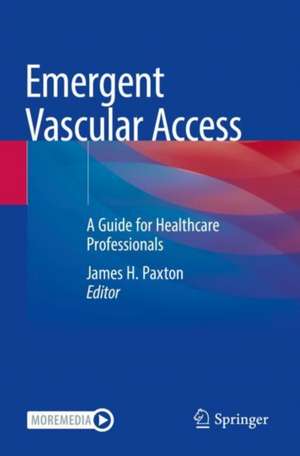Emergent Vascular Access: A Guide for Healthcare Professionals
Editat de James H. Paxtonen Limba Engleză Paperback – 4 sep 2022
This book focuses on the placement of vascular access devices under emergent conditions, including the techniques and devices needed to achieve successful device deployment in even the most critically-ill patient.
Up-to-date references and evidence for best practices are provided, informing both the novice and experienced healthcare provider. Each chapter is meticulously researched, including individual chapters focusing upon peripheral intravenous, intraosseous, central venous, and ultrasound-guided catheter placement. Device selection and emergent decision-making are discussed at length, including such crucial determinants as infusion flow rates, device limitations, issues with medication incompatibility, complications of line placement, and the relative indications and contraindications associated with various vascular access approaches.
Emergent Vascular Access is an essential resource for any healthcare provider who places or manages vascular access devices in critically-ill patients, including emergency and ICU physicians, residents, rapid response providers, EMS paramedics, patient care technicians, medical students, and nurses.
| Toate formatele și edițiile | Preț | Express |
|---|---|---|
| Paperback (1) | 668.87 lei 38-44 zile | |
| Springer International Publishing – 4 sep 2022 | 668.87 lei 38-44 zile | |
| Hardback (1) | 922.81 lei 38-44 zile | |
| Springer International Publishing – 3 sep 2021 | 922.81 lei 38-44 zile |
Preț: 668.87 lei
Preț vechi: 704.08 lei
-5% Nou
Puncte Express: 1003
Preț estimativ în valută:
127.98€ • 133.99$ • 105.90£
127.98€ • 133.99$ • 105.90£
Carte tipărită la comandă
Livrare economică 02-08 aprilie
Preluare comenzi: 021 569.72.76
Specificații
ISBN-13: 9783030771799
ISBN-10: 3030771792
Pagini: 346
Ilustrații: XVI, 346 p. 174 illus., 170 illus. in color.
Dimensiuni: 155 x 235 mm
Greutate: 0.68 kg
Ediția:1st ed. 2021
Editura: Springer International Publishing
Colecția Springer
Locul publicării:Cham, Switzerland
ISBN-10: 3030771792
Pagini: 346
Ilustrații: XVI, 346 p. 174 illus., 170 illus. in color.
Dimensiuni: 155 x 235 mm
Greutate: 0.68 kg
Ediția:1st ed. 2021
Editura: Springer International Publishing
Colecția Springer
Locul publicării:Cham, Switzerland
Cuprins
Chapter 1. What is Emergent Vascular Access?.- Chapter 2. The Anatomy of Vascular Access.- Chapter 3. The Physiology and Physics of Vascular Access.- Chapter 4. Types of Vascular Access Devices.- Chapter 5. Peripheral Intravenous (PIV) Devices.- Chapter 6. Central Venous Catheter Devices.- Chapter 7. Intraosseous Devices.- Chapter 8. Alternative Vascular Access Solutions.- Chapter 9. What is Difficult Vascular Access (DVA)?.- Chapter 10. Decision-Making in Emergent Vascular Access.- Chapter 11. High-Risk Presentations (e.g., Cardiac Arrest, Shock, etc.).- Chapter 12. The Future of Emergent Vascular Access.
Notă biografică
James H. Paxton, MD MBA FACEP FAHA
Assistant Professor, Department of Emergency Medicine
Wayne State University School of Medicine
Director of Clinical Research, Department of Emergency Medicine
Detroit Receiving Hospital
Detroit, MI
Textul de pe ultima copertă
This book focuses on the placement of vascular access devices under emergent conditions, including the techniques and devices needed to achieve successful device deployment in even the most critically-ill patient.
Up-to-date references and evidence for best practices are provided, informing both the novice and experienced healthcare provider. Each chapter is meticulously researched, including individual chapters focusing upon peripheral intravenous, intraosseous, central venous, and ultrasound-guided catheter placement. Device selection and emergent decision-making are discussed at length, including such crucial determinants as infusion flow rates, device limitations, issues with medication incompatibility, complications of line placement, and the relative indications and contraindications associated with various vascular access approaches.
Emergent Vascular Access is an essential resource for any healthcare provider who places ormanages vascular access devices in critically-ill patients, including emergency and ICU physicians, residents, rapid response providers, EMS paramedics, patient care technicians, medical students, and nurses.
Caracteristici
Discusses relevant anatomy, devices, and techniques for obtaining vascular access rapidly and reliably Examines the pros and cons of peripheral intravenous, intraosseous, and central venous devices as well as pre-existing lines Teaches providers how to overcome a variety of obstacles to obtaining vascular access for their patients Covers high-risk presentations such as cardiac arrest and shock
